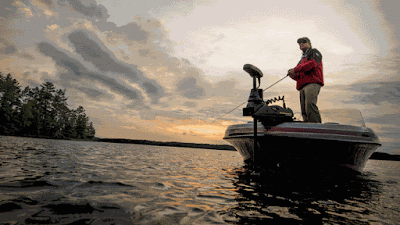Friday, October 20, 2017
Darn! And To Think I Just Ran Out and Bought a New Rabbit's Foot
"I've said before that, if bass tournaments had anything to do with luck, the same guys wouldn't continue to win them over and over. Luck would spread out the results, like random numbers or lottery picks."
Thus said Joe Balog, the often outspoken owner of Millennium Promotions, Inc., and former Bassmaster Open and EverStart Championship winner.
"I have always been intrigued, almost fascinated, with the anglers who seem to know how to win...this 'other level' of anglers in our sport who end up in the winner's circle repeatedly," he continued.
Granted, Balog was referring to bass pros when he made these statements, but the same principle applies to those who fish local bass contests, too.
New Englander Jim Gildea is one such angler who agrees with Balog's philosophy that "mere chance has little to do" with winning bass tournaments.
According to this avid finesse fisherman and outdoor writer, it's a matter of "putting in the practice (time) and learning the patterns of the bodies of water you're fishing," as he advises.
If you need evidence of how well his advice works, consider that he cashed checks in 13 of 14 tournaments in 2016, and in one other recent year, he made money in 27 of 30 contests.
Here are some key points that Gildea feels have helped him cash so many checks from local bass tournaments:
"Focus on one body of water. If you are like most people, you have limited time. Pick one or two lakes (ideally, they are similar if you pick two) that suit your style. Learn how to fish them and follow them through the seasons. The more tournaments you fish, the better you learn the lakes, and the more you refine your technique. Pick one close to your house, so you can get there as often as possible, and try to learn something new every time you go--even if you only have an hour to fish.
"Fish a trail. Tournament trails take you to different lakes, so you are not always seeing the same "local experts" each time. Ideally, your 'focus lake' will be on the circuit, so you'll cash in that one, but on the other lakes, you won't have to worry about all the local dudes showing up, because they aren't fishing the trail.
"Ignore everyone's opinion. I like to finesse fish, and I'm pretty good at it (actually, it's all I'm good at). I'm probably the only guy in history to win an Eastern Divisional with 46 pounds over three days in grass, using 6-pound test. For years, I heard over and over how I had to learn to throw a jig or a spinnerbait, or I never would be 'really good.' Once I started focusing on what I was good at, I started to finish in the money all the time. Sure, I can't be a pro fisherman with one style, but I can win a lot locally.
"Keep a log. I have detailed records going back 10 years on all my local lakes. All my fishing buddies tell me, 'I can remember that stuff; I don't need a log.' But I can look back and tell them exactly what the water temp needs to be for the fish to show up in certain coves.
"Master a single technique. If you want to do well locally, you should learn to do one thing really well. Versatility is much more important for the traveling pro, who has to fish lots of different lakes. Since we have a lot of clear water where I live, I fish weightless plastics in the spring and drop shot in the summer and fall. If I lived in Tennessee, I probably would throw the shaky head a lot, since it works most of the year, and it seems like you always could get a decent limit on it, no matter how tough the bite. My friend always says, 'Beware the guy with one rod on the deck.' I go one better: I often have only two rods in the entire boat, and one is just a backup."
According to some psychologists, one way to get over a negative experience is to write about it. Does that suggestion really work? I honestly don't have a clue, but I assembled this blog post in hopes it might ease the humiliation I felt after this past weekend's tournament.
Subscribe to:
Post Comments (Atom)



No comments:
Post a Comment